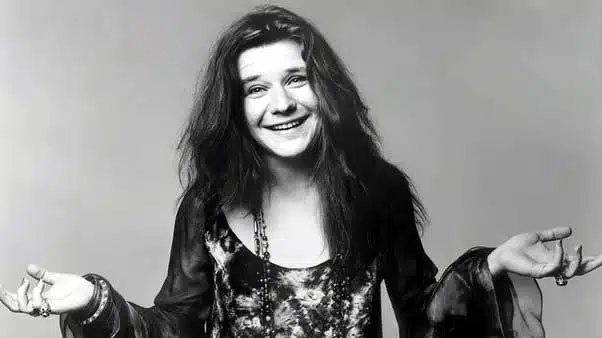Janis Joplin | Heroin Overdose Death
- How Did Janis Joplin Joplin Die?
- About Janis Joplin
- Big Brother & The Holding Company
- Solo Career
- Legacy
- History Of Substance Abuse
- Did Janis Joplin Attend Rehab?
- Recovery Is Possible

American musician and singer Janis Joplin is well-known for her bluesy style and raw vocals. Unfortunately, she is also well-known for dying of a drug overdose at an early age.
Along with Jimi Hendrix, Jim Morrison, Amy Winehouse, and Kurt Cobain, Joplin is one of the many musicians who died at the age of 27.
How Did Janis Joplin Joplin Die?
Janis Joplin died on October 4, 1970 at the age of 27 in Hollywood, California.
According to Los Angeles County coroner, Thomas Naguchi, her cause of death was an accidental heroin overdose. She was discovered lying on the floor of her hotel room with cigarettes and money in her hands. She also had needle marks on her arms.
She was found by her road manager John Cooke at the Landmark Motor Hotel after she failed to show up for a recording session.
Cooke believed she had been given heroin that was much stronger than what she normally used and that’s what ultimately led to her fatal overdose.
Overdose Death Dispute
Joplin’s close friend, Peggy Caserta, who she met at Caserta’s hippie clothing store in 1965, does not believe Joplin died of a drug overdose.
As Caserta wrote in her book, I Ran Into Some Trouble, she believes Joplin fell in her hotel room when the heel of her sandal got stuck in the rug. Caserta speculates Joplin broke her nose during the fall and died of asphyxiation from the blood in her throat.
About Janis Joplin
Janis Joplin was born on January 19, 1943 in Port Arthur, Texas to Dorothy Bonita East and Seth Ward Joplin.
As a teenager, Joplin hung around with blues singers like Bessie Smith, Ma Rainey, and Lead Belly who she said influenced her decision to become a singer.
Big Brother & The Holding Company
In 1966, Joplin made her way to San Francisco where she joined Big Brother and the Holding Company. It was with this group that she would ultimately become famous after they performed “Ball and Chain” at the Monterey Pop Festival in 1967.
That fame increased even more with their 1968 album Cheap Thrills. After that album, Joplin left the group to start her solo career.
Solo Career
In 1969, Joplin performed at Woodstock and then went on to produce some of her most well-known songs such as:
- “Piece of My Heart”
- “Get It While You Can”
- “Me and Bobby McGee”
- “Mercedes Benz”

Following her Woodstock performance, she also made I Got Dem Ol’ Kozmic Blues Again Mama! with Kozmic Blues Band.
In 1970, Joplin was in Los Angeles making Pearl with Full Tilt Boogie Band. Pearl is the album that would end up being the biggest of her career. The record reached number one on the Billboard charts, but she did not live to see its release.
Legacy After Death
Years after her death, Joplin was inducted into the Rock and Roll Hall of Fame in 1995 and was given a Lifetime Achievement Grammy Award in 2005.
She also remained one of the top-selling musicians in the US with 18.5 albums sold according to the Recording Industry Association of America. She was also number 46 on the 2004 Rolling Stones list, 100 Greatest Artists of All Time.
Janis Joplin’s History Of Substance Abuse
Janis Joplin used drugs and alcohol for most of her career.
After 1963, when her career didn’t gain much traction, she moved to New York City. But her luck didn’t change because her drinking and drug use got in the way. She was regularly using amphetamines as well as psychedelic drugs.
Joplin moved to San Francisco before eventually moving back to Texas to get her life back together in 1965.
Unfortunately, when she joined Big Brother and the Holding Company in 1966, her drug and alcohol use started again. She began using heroin and continued to abuse amphetamines and bourbon.
Did Janis Joplin Attend Addiction Treatment?
It is unknown whether Joplin received any treatment for her drug or alcohol addiction.
When she went back home in 1965 to work on herself, it’s possible she received some form of therapy or treatment, but there is no documentation on the matter.
Recovery Is Possible
Although musicians and rockstars like Janis Joplin live wild lifestyles that involve drugs and alcohol, the story of untimely overdose death is all too common.
Thankfully, recovery is possible with a combination of professional treatment services, motivation, and ongoing support from loved ones.
To learn how we build a network of support around people living with addiction, please contact us today.
Written by Ark Behavioral Health Editorial Team
©2024 Ark National Holdings, LLC. | All Rights Reserved.
This page does not provide medical advice.
All That’s Interesting - Inside The Sudden Death Of Janis Joplin, The Soulful Voice Of The Hippie Generation
History - Janis Joplin dies of a heroin overdose
Rolling Stone - A Close Friend Offers a Fresh Perspective on Janis Joplin’s Tragic Story

Questions About Treatment?
Ark Behavioral Health offers 100% confidential substance abuse assessment and treatment placement tailored to your individual needs. Achieve long-term recovery.
100% confidential. We respect your privacy.
Prefer Texting?
Our friendly support team is here to chat 24/7. Opt out any time.







 Learn More
Learn More








